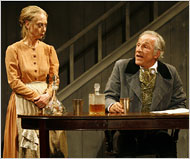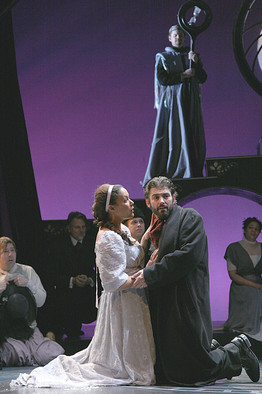I review two off-Broadway plays in today’s Wall Street Journal drama column, Friendly Fire’s revival of Eugene O’Neill’s A Touch of the Poet and the Playwrights Horizons premiere of Craig Lucas’ Prayer for My Enemy. The first is masterly, the second awful. Here’s an excerpt.
* * *
 Eugene O’Neill is the most frustrating of major playwrights, for his output was so uneven and his craft so unsure that even the best of his plays can be made to look amateurish by a weak staging. I was fooled, for instance, by the Roundabout Theatre Company’s 2005 revival of “A Touch of the Poet,” which was so far off the mark that I mistakenly thought the play itself was at fault. Unlike that over-fancy production, Friendly Fire’s Off-Broadway staging is a bargain-basement affair acted on the plainest of sets by a cast consisting mostly of near-unknowns–but it packs the punch of a bullet in the belly.
Eugene O’Neill is the most frustrating of major playwrights, for his output was so uneven and his craft so unsure that even the best of his plays can be made to look amateurish by a weak staging. I was fooled, for instance, by the Roundabout Theatre Company’s 2005 revival of “A Touch of the Poet,” which was so far off the mark that I mistakenly thought the play itself was at fault. Unlike that over-fancy production, Friendly Fire’s Off-Broadway staging is a bargain-basement affair acted on the plainest of sets by a cast consisting mostly of near-unknowns–but it packs the punch of a bullet in the belly.
Daniel J. Travanti, to be sure, isn’t exactly unknown: He was the star of “Hill Street Blues,” one of the most admired TV series of the ’80s. My guess, though, is that his name will be unfamiliar to younger readers, since he’s spent the past couple of decades working in regional theater and appearing in forgettable made-for-TV movies. His 2007 Off-Broadway performance in Oren Safdie’s “The Last Word…” was the first time he’d acted on a New York stage, and this is the second. Yet Mr. Travanti is galvanically powerful as Con Melody, a drunken tavernkeeper who once was an officer and a gentleman and hates the lesser man he has become. On paper Mr. Travanti is miscast–he’s 68, nearly a quarter-century older than the character he’s playing–and his ferocious performance is devoid of the decayed Irish charm that O’Neill seems to have had in mind. Instead he gives us an angry failure who is teetering on the far edge of madness, an interpretation that may well be “wrong” (whatever that means) but is still tremendously exciting. If Con had lived as long as Mr. Travanti, I feel sure that this is what he would have become….
Craig Lucas has written good plays–I very much liked “Small Tragedy”–but “Prayer for My Enemy” is a mess, a mishmash of mawkish clichés that tries frantically to sound profound.
In order of appearance, Mr. Lucas gives us:
• Billy, who joined the Army to prove that he was a real man. Yes, he got sent to Iraq. Yes, he got wounded there. Yes, he’s against the war (“It’s bad because it was bad before we got there and now it’s bad in a new way”). Yes, he’s gay. Yes, he’s in denial about it.
• Tad, a bisexual slacker who slept with Billy in high school and wants to do it again.
• Dolores, a motor-mouthed neurotic.
• Marianne, Billy’s unhappy older sister, whom Tad impregnates and marries even though he still has the hots for Billy. Yes, she’s been divorced. Yes, she has a child by her first husband. Yes, her son is autistic….
* * *
Read the whole thing here.
Archives for 2008
TT: Almanac
“The time to make up your mind about people, is never.”
Philip Barry, The Philadelphia Story
TT: So you want to see a show?
Here’s my list of recommended Broadway, off-Broadway, and out-of-town shows, updated weekly. In all cases, I gave these shows favorable reviews (if sometimes qualifiedly so) in The Wall Street Journal when they opened. For more information, click on the title.
Warning: Broadway shows marked with an asterisk were sold out, or nearly so, last week.
BROADWAY:
• Alfred Hitchcock’s The 39 Steps (comedy, G, suitable for bright children, reviewed here)
• August: Osage County (drama, R, adult subject matter, reviewed here)
• Avenue Q (musical, R, adult subject matter and one show-stopping scene of puppet-on-puppet sex, reviewed here)
• Boeing-Boeing (comedy, PG-13, cartoonishly sexy, closes Jan. 4, reviewed here)
• Dividing the Estate * (black comedy, G, far too serious for children, reviewed here)
• Equus (drama, R, nudity and adult subject matter, closes Feb. 8, reviewed here)
• Gypsy (musical, PG-13, adult subject matter, closes Mar. 1, reviewed here)
• Irving Berlin’s White Christmas * (musical, G, suitable for children capable of enjoying a love story, closes Jan. 4, reviewed here)
• The Little Mermaid (musical, G, entirely suitable for children, reviewed here)
• A Man for All Seasons * (drama, G, too intellectually demanding for children of any age, closes Dec. 14, reviewed here)
• South Pacific * (musical, G/PG-13, some sexual content, brilliantly staged but unsuitable for viewers acutely allergic to preachiness, reviewed here)
IN MADISON, N.J.:
 • The Winter’s Tale (Shakespeare, G/PG-13, not suitable for small children, closes Dec. 28, reviewed here)
• The Winter’s Tale (Shakespeare, G/PG-13, not suitable for small children, closes Dec. 28, reviewed here)
OFF BROADWAY:
• Back Back Back (drama, PG-13, adult subject matter, closes Jan. 25, reviewed here)
• The Fantasticks (musical, G, suitable for children capable of enjoying a love story, reviewed here)
• My Vaudeville Man! (musical, G, closes Jan. 4, reviewed here)
TT: Almanac
“All political lives, unless they are cut off in midstream at a happy juncture, end in failure, because that is the nature of politics and of human affairs.”
Enoch Powell, Joseph Chamberlain
TT: Snapshot
Lawrence Tibbett sings “Votre toast” (from Bizet’s Carmen) in Metropolitan:
(This is the latest in a weekly series of arts-related videos that appear in this space each Wednesday.)
TT: Else what’s a metaphor?
I see that Patrick Appel, Andrew Sullivan’s stand-in, has nominated me for a poseur award for having written the following paragraph in yesterday’s posting about The Letter:
I know how it feels to see the design for the dust jacket of a book that I’ve written, but that’s different: the cover is not the book. An opera, on the other hand, truly exists only in performance, and must be created anew each time it is produced: the score is not the show. As I saw how Hildegard had transformed my libretto into a three-dimensional object, a Biblical phrase popped into my mind: Thus the word was made as flesh.
Not having read “The Daily Dish” for a number of years, I didn’t know that Sullivan had acquired a “trusty colleague” (his phrase). Alas, the colleague in question wasn’t very trustworthy on this occasion, or very knowledgeable.
Needless to say, only a poseur of the highest possible voltage would have compared himself to the incarnate Christ–and I didn’t. “Thus the word was made as flesh” is not a literal quotation from John 1:14. It is, rather, a metrical paraphrase of the Latin translation of the first six words of that familiar verse, and it comes from one of the many English-language versions of “Verbum caro factum est,” Hans Leo Hassler’s popular sixteenth-century Christmas motet:
I sang that lovely motet in high school long, long ago, which explains why the anonymous translator’s euphonious rendering of the Biblical phrase that is its title happened to come to mind as a metaphorical description of what it feels like to have your words turned into a set design.
Most literate people, of course, know a metaphor when they see one, but you can’t please everyone….
UPDATE: Thank you, Megan, Isaac and Alex.
The ongoing controversy over this posting and its predecessor, by the way, has octupled the number of midweek hits normally received by “About Last Night.” Repeat after me: there is no bad publicity!
TT: Out of commission
 I’m having a tooth pulled this morning. If you need anything, ask me tomorrow.
I’m having a tooth pulled this morning. If you need anything, ask me tomorrow.
UPDATE: I’m home again, in two pieces and under doctor’s orders to take it easy for the rest of the day, a commitment I was more than happy to make. I have a mouthful of gauze and a numb left nostril, but otherwise I feel perfectly fine.
In honor of Dr. Richard Giannandrea, the deft practitioner of painless dentistry who did the job on me, here’s an encore presentation of one of the funniest moments of my adolescence:
TT: Almanac
“I find the public passion for justice quite boring and artificial, for neither life nor nature cares whether justice is ever done or not.”
Patricia Highsmith, Plotting and Writing Suspense Fiction
